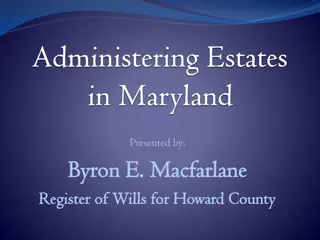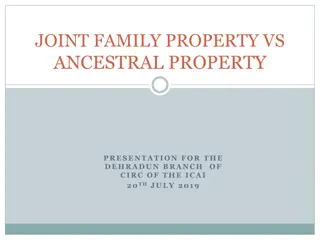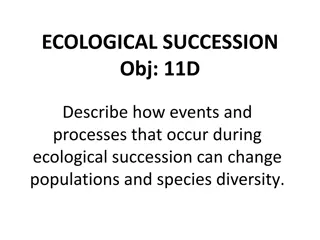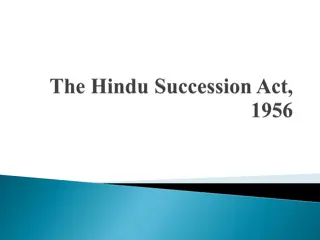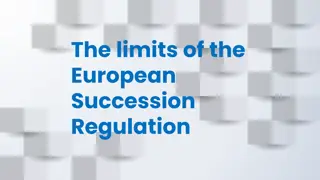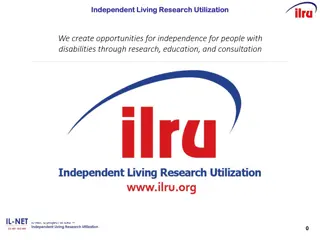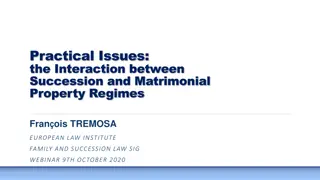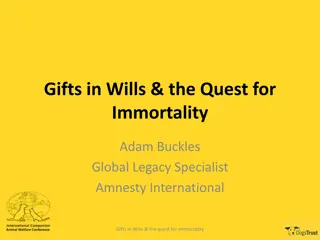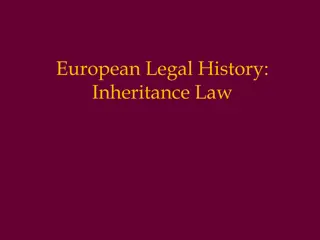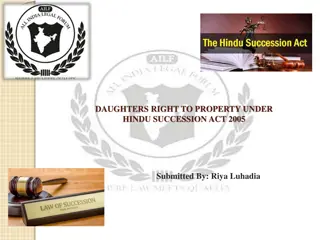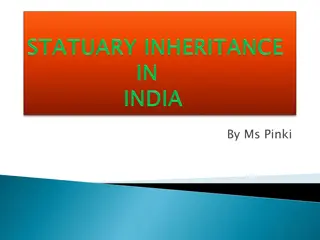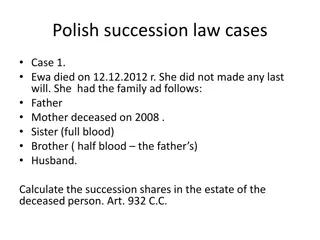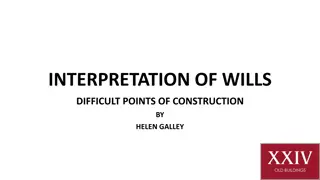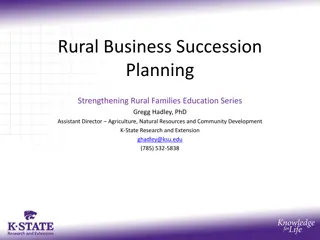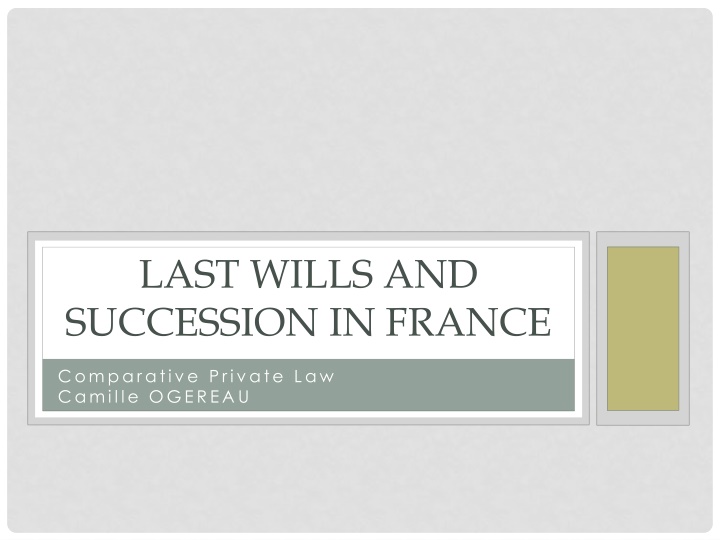
Last Wills and Succession in France's Private Law
Explore the intricate legalities of wills and successions in France, covering different types of testaments, general dispositions, who can draft a will, and the specifics of holograph wills. Learn about the conditions required for drafting a will and the formalities for validity to ensure a smooth succession process.
Download Presentation

Please find below an Image/Link to download the presentation.
The content on the website is provided AS IS for your information and personal use only. It may not be sold, licensed, or shared on other websites without obtaining consent from the author. If you encounter any issues during the download, it is possible that the publisher has removed the file from their server.
You are allowed to download the files provided on this website for personal or commercial use, subject to the condition that they are used lawfully. All files are the property of their respective owners.
The content on the website is provided AS IS for your information and personal use only. It may not be sold, licensed, or shared on other websites without obtaining consent from the author.
E N D
Presentation Transcript
LAST WILLS AND SUCCESSION IN FRANCE Comparative Private Law Camille OGEREAU
SOURCES Book III: Of the various ways in which one acquires the property Title I : Successions General rules about successions and intestate succession Title II : Liberalities Chapter V : Testamentary dispositions Article 895 : A testament is an act by which the testator disposes, for the time when he will no longer exist, of all or part of his assets or his rights, and that he may revoke
4 TYPES OF TESTAMENTS Testament olographe : holograph will Testament authentique : public will Testament mystique : secret will Testament international : international will
GENERAL DISPOSITIONS Prohibition of joint wills If one document with wills and signatures of two authors If two documents with an intellectual link : both contents cannot be dissociated Prohibition of oral will But if proven, can constitue a natural obligation Central Registry of Wills = Fichier Central des Dispositions de Derni res Volont s (FCDDV) created in 1972
WHO CAN DRAFT A WILL? Two conditions required : Being sane Having the legal capacity to dispose of his property Minors between 16 and 18 can only have half of their property Some forms of wills can be inaccessible in certain cases Illiterate for olograph will
HOLOGRAPH WILLS Solemn act : formalism for validity : three conditions Written by the hand of the testator Support and writing tool do not matter Can be assisted or copy a model as soon as it is testator s own work Cancellations, additions and modifications : allowed. But additions later : forbidden if they change the substance Signed By the hand of the testator To demonstrate its authenticity and provenance Proper signature required : name and surname insufficient Graphism that the testator is used to use
HOLOGRAPH WILLS Dated Should be precise : day, month and year Incomplete date can be reconstituted by recourse to intrinsic and related extrinsic factors Allow chronology to be ascertain In case of several wills Time at which the testator must have testamentary capacity
PUBLIC WILLS Lot of formalism Authenticated by two notaries or one notary in the presence of two witnesses Have to be present from the beginning to the signature Dictation : substancial formality Should be verbal and made by the testator himself in a language that the notary can understand Since February 2015, interpreter is allowed Notary writes down what is saying by hand or mecanic way Can help to formulate more accurately Will is read over to the testator Testator signs in presence of notary and witnesses
SECRET WILLS Between olograph and public will Testator prepare a will on his own and sign it Can be help by someone else No need to be written by himself Close, stamp and seal up the will Present the will to a notary and two witnesses Notary draw up a superscription act (acte de suscription)
INTERNATIONAL WILLS Washington Convention on the Form of an International Will : 26/10/1973 Ratified by France in 1994 Two documents The will Private document preparate by the testator or someone else Writtent by any means in any language Declaration and notarial certificate Testator hands the document open to a notary and declars orally that it contains his will Notary writes a certificate and attaches it to the will Testator and notary conserve a copy
EMERGENCY WILLS Testaments of soldiers, of sailors in the State navy, and of persons employed with the armies Communication impossible because of a contagious disease Island within the metropolitan territory or within an overseas department, where there is no office of notary, when it is impossible to communicate with the department of which this island is a part In the course of a sea voyage, either on the way or during a stoppage in port, where it is impossible to communicate with land, or where , if one is in a foreign country, there is present no French diplomatic or consular agent vested with the functions of a notary
WILL MADE OUT OF FRANCE French person living in another country can make a will in the form used in the place where the act is made To be executed in France, the will as to be registered : in the office of the domicile or last domicile of the testator or in the office of the location of an immovable if there is a disposition about it
APPLICABLE LAW Article 1of La Haye s Convention of 5 October 1961 on the Conflicts of Laws Relating to the Form of Testamentary Dispositions A testamentary disposition shall be valid as regards form if its form complies with the internal law: a) of the place where the testator made it, or b) of a nationality possessed by the testator, either at the time when he made the disposition, or at the time of his death, or c) of a place in which the testator had his domicile either at the time when he made the disposition, or at the time of his death, or d) of the place in which the testator had his habitual residence either at the time when he made the disposition, or at the time of his death, or e) so far as immovables are concerned, of the place where they are situated.
CONTENT OF THE WILLS By definition, supposed to concerns estates of the testator In fact, several dispositions can be made Appointment of a guardian for a minor Appointment of an executor Recognition of a natural child Disinheritence Legacy Universal legacy Legacy under universal title Particular legacies
RESERVE PORTION AND DISPOSABLE PORTION Testator cannot dispose as he wants of all of his property A reserve portion should be preserve for reservee successor descendants, surviving spouse Possibility for reservee successor to renounce
REVOCATION Principle of free revocability Until death Express revocability Posterior will Notary declaration of change of will Implied revocability Incompatible wills Alienation of the thing bequeathed Destruction of the will Reconsideration beyond the will of testator Nullity Lapse Judicial revocation
SETTLEMENT OF THE SUCCESSION Four main steps : Notarial deed establishing (acte de notori t ) List of people who will receive inheritence Family gives documents concerning wills or donation between spouses to the notary The notary check the Central Registery of Wills Full statement of the deceased s property Properties and assets and their value Debts Fulfillment of the mortgage and tax formalities related to death Division The heirs can decide to stay in the undivided shares scheme


